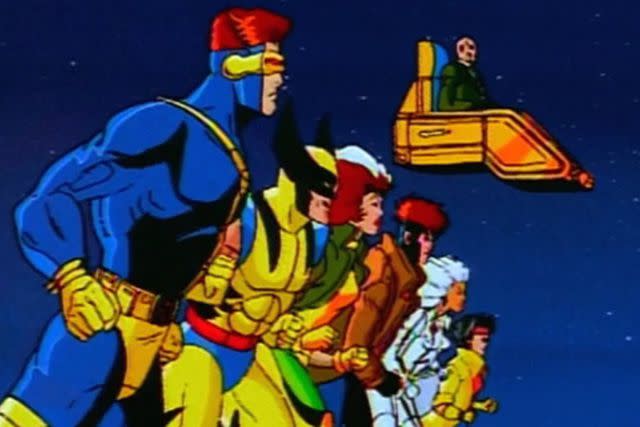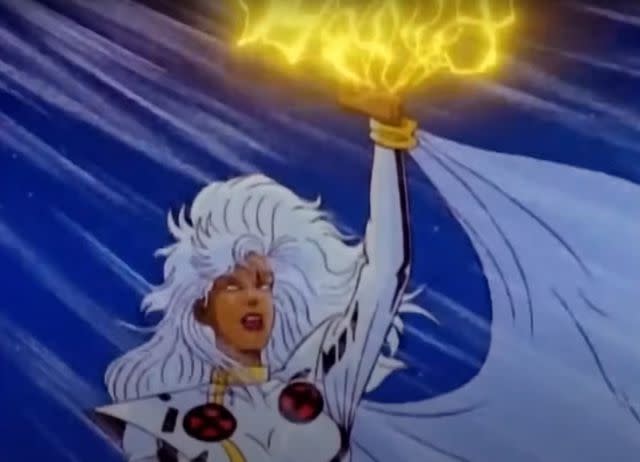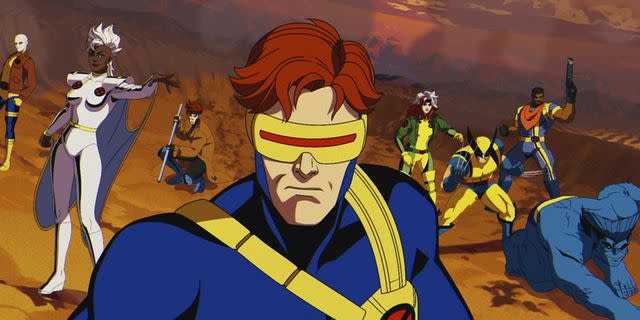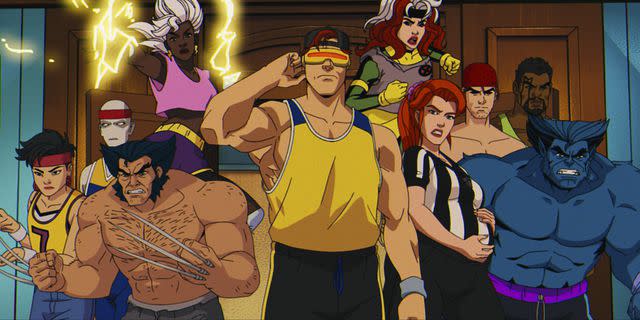How “X-Men '97” embraces the legacy of the original series
The team behind the sequel to "X-Men: The Animated Series" looks back on how the original cartoon became the GOAT.
The legacy of 1992’s X-Men: The Animated Series can be found all over the present-day Marvel Cinematic Universe.
When Patrick Stewart returned as Charles Xavier in 2022’s Doctor Strange in the Multiverse of Madness, he came complete with a yellow hoverchair, which was consistent with the character's appearance in that Saturday morning cartoon, as was the sound of that catchy theme music, the opening credits banger of the '90s original. The familiar tune returned again in 2023’s The Marvels, in a post-credits scene that brought back Kelsey Grammer’s Beast from the Fox-era live-action X-Men movies.
“I remember thinking, smart move,” Beau De Mayo, showrunner behind X-Men ‘97 and a fan of Marvel’s mutants since childhood, tells EW in an interview. (This interview was conducted weeks before his unexpected and abrupt exit from the series.) “It’s like John Williams’ Superman theme. It is just so iconic and in our brains. It's never going to go anywhere.”
Those examples alone paint a clear picture of just how much of an impact the first cartoon had on a lot of the superhero storytelling we’ve come to enjoy over the decades. It's that legacy the team behind X-Men '97 wanted to embrace to remind everyone why these characters are the GOAT. "Our guiding principle on the show was to emulate our memory of it," says Brad Winderbaum, the head of streaming, television, and animation at Marvel Studios. "As creators, we are not inside a bubble. We are part of the culture that is also the audience. So for something like this that was so seminal for many of us growing up, our success came from following our passion."
Rewind to the '90s

Fox
The X-Men of 'X-Men: The Animated Series'X-Men: The Animated Series debuted on U.S. TV sets in October 1992 as part of the Fox Kids Saturday morning lineup of cartoons, which also included Bobby's World, Power Rangers, The Tick, and Batman: The Animated Series. Headed by Eric Lewald, the series brought to life the mutant characters of Stan Lee and Jack Kirby's comics with a team consisting of Cyclops (Norm Spencer), Jean Grey (Catherine Disher), Wolverine (Cal Dodd), Storm (Alison Sealy-Smith), Rogue (Lenore Zann), Gambit (Chris Potter), Beast (George Buza), Jubilee (Alyson Court), Professor X (Cedric Smith), and a new character created for TV, Morph (Rob Rubin).
It was a show about a superhero team fighting to protect a world that largely hates and fears mutants, often times adapting and remixing classic comic book storylines, like The Dark Phoenix Saga and Days of Future Past. For Winderbaum, it was his gateway to comic books.
"The original series was so dramatic," he says, "and as a young kid, it was like nothing I'd ever seen before."
DeMayo describes that tone like a soap opera. "We have a bunch of missions to go after, but, man, I really think that person's hot and I want to be with them. But oh no! They love this other person. Oops! Now we're fighting Juggernaut," the writer/producer recalls of the storylines. "That is the core of what makes the X-Men so special and so fun: grown adults that still act like teenagers sometimes."

Marvel
Alison Sealy-Smith voices Storm in 'X-Men: The Animated Series'Adding to the soap, a character like Storm, who often makes dramatic declarations every time she uses her power to manipulate the weather, will always announce her moves in advance. "You can imagine somebody like me, who did absolutely nothing but Shakespeare for five years of my career there, I was made for these beautiful one-liners: 'Summoning the power of the arctic winds!' 'Rise, desert sands!'" Storm voice actress Sealy-Smith says. "I was in my element."
Meanwhile, someone like Jean Grey, DeMayo's favorite character, will always be one of the more theatrical ones. He refers to what has now become a meme: the telekinetic and telepathic mutant constantly fainting after seemingly little exertion. "We need those moments," he says.
Winderbaum has trouble choosing his favorite character, but says, "I realize how influential Lenore was as Rogue on me in my life."
"When we first did the show, we had absolutely no idea how it would be received," Zann, the woman behind Rogue, recalls. "Let's look at those times. I often hear Larry Houston, the original director, talking about when he was trying to pitch it to studios in Hollywood at the time. He couldn't find studios that were interested in doing the show because they said, 'Well, who wants to watch an animated series about superheroes?' Fast forward, and obviously they've changed their tunes."
X-Men: The Animated Series would go on to air five seasons, culminating in the 1997 series finale episode "Graduation Day." DeMayo firmly believes that if it wasn't for this cartoon, Captain America, Iron Man, the Avengers, and the rest of the Marvel Cinematic Universe wouldn't exist today.
"In many ways, I came to X-Men 1 because I watched the cartoon and I was so enamored with it," he says of Bryan Singer's live-action X-Men movie of 2000. "I sincerely believe if X-Men 1 hadn't done well, Spider-Man 1 [Sam Raimi's 2002 film] would never have happened. If Spider-Man had never happened, we would never be where we are with comic book movies now."
A life of its own

Marvel Animation
Morph, Storm, Gambit, Cyclops, Rogue, Wolverine, Bishop, and Beast return in 'X-Men '91'X-Men '97 now picks up directly where X-Men: The Animated Series left off. The world, both inside and outside the show, has changed, but the new series hopes to spread a similar message of acceptance, much like the one Zann and her costars find when attending fan conventions. Something that sticks out to her now are those fans who cosplay as her version of Rogue — even men.
"It doesn't matter what gender or what nationality or what ethnicity they are, I always say there's a little Rogue in all of us," Zann says. "That's great that they can take the essence of that character and feel that she is also within them."
Over the years, the X-Men struck a nerve with the fandom in ways even the original creators probably weren't expecting. "I definitely started noticing just how many people wear X-Men T-shirts going out in West Hollywood where there's a huge gay community," DeMayo remarks of the Los Angeles hotspot. "Obviously, the X-Men are very important to queer people. If you grew up in the '90s, it is honestly how a lot of us related to these characters."
The mutants of the X-Men are often seen as a metaphor for the struggle of LGBTQ people; less "obvious" mutants have to "come out" to their parents when they're young and face the fear of being disowned as a result, political zealots attempt to pass bills to dehumanize them, and there's even a Legacy Virus introduced in the comics that's seen as an allegory for the AIDS crisis — just to name a few comparisons.
One way X-Men '97 attempts to connect with that legacy is with Morph, now voiced by JP Karliak. DeMayo previously stated that they approached the character, who can shapeshift into any person, male or female, as nonbinary. The character's primary appearance now takes on a more androgynous, otherworldly look that's similar to the comic book character the inspired him, Changeling.

Marvel Animation
Marvel's mutants return in 'X-Men '97,' the sequel to 'X-Men: The Animated Series'"He is the Morph from the OG series that has changed and evolved over time, and there is a connection between them," Winderbaum says. "So much of the X-Men is about creating conversation. It is about holding a mirror up to the world, about coexistence, and about how you fight for peace in a world that fears you. So there is just inherently something that resonates about that character, but about the X-Men in general with people that feel marginalized."
The original series didn't stop there; it taught kids about discrimination at large, sometimes in more overt ways. Sealy-Smith recalls a now widely recognized scene in which Storm and Wolverine walk into a bar. They're not discriminated against for being mutants, but for being a mixed-raced couple. "Race-based discrimination? How quaint," Storm says in response.
"That's what I love about this show, the fact that it's grown-up writing, which is so easily accessible by kids," Sealy-Smith remarks of that moment. "The truth is, I don't know if that line would mean anything to my 7-year-old grandson. He just wants to see Storm fight somebody and win. That's the beauty of the show, the fact that it appeals to such a wide audience because your access points are just different."
DeMayo, who grew up as a mixed race gay man in an adopted family, says he found himself at the intersection of "this weird Venn diagram."
"My parents are white, my siblings are Korean, we're all adopted, and there's a lot of things that make us different," he says. "But I think, and it sounds so cheesy to say this, I do subscribe to the Charles Xavier model: Even at our most different, there's a lot we still have in common." That's how he wanted to approach the sequel series. "Ultimately, you can take all the philosophy of Xavier's dream, but if you boil it down, empathy is the way into the future."
"He really touched on something fundamental about the X-Men, that it was a found family," Winderbaum says of DeMayo's vision for X-Men '97. "I think the X-Men, because of who they are, inherently make people feel seen, make people feel like they're allowed to use their voice. That conversation is at the heart of the show."
You know what else is at the heart of the show? Childhood wish fulfillment. A notable scene from the sequel's trailers shows Gambit riding on Wolverine's back and using his ability to power up his teammate's adamantium claws with exploding energy. "That bit was in Jake's initial pitch, and it's in the show," Winderbaum notes of supervising producer/head director Jake Castorena. "As was Cyclops using his optic blast to land [out of the X-Jet]."
"I know it sounds so..." DeMayo adds, making a "meh" face, "but it is a love letter to fans of the original series — and just X-Men fans."
X-Men '97 premieres Wednesday, March 20, on Disney+.
Sign up for Entertainment Weekly's free daily newsletter to get breaking TV news, exclusive first looks, recaps, reviews, interviews with your favorite stars, and more.
Related content:
X-Men '97 creator unexpectedly fired a week before series premiere
X-Men '97 will resurrect classic animated mutant series for Disney+
Of course the best superhero TV theme music will return for X-Men '97
Read the original article on Entertainment Weekly.


